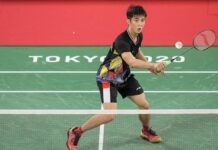South Korea’s Winter Olympics head organiser has appealed to the nuclear-armed North, which remains technically at war with his country and boycotted the 1988 Seoul Games, to join in a “peace” Olympics next year.
Lee Hee-Beom is president and CEO of the Pyeongchang Organising Committee for the Olympic Games (POCOG), which will take place in a province that saw fierce battles during the 1950-1953 Korean War.
The conflict ended with an armistice rather than a peace treaty, but Lee urged the North to send its athletes to the Games, which open a year from Thursday.
The “spirit” of the Olympics was peace, he said, citing the traditional suspension of wars in Greece where the Games originated in 776 BC.
“The basic principles of Olympics is peace,” he told AFP at the POCOG offices in Pyeongchang. “Anyone who loves peace should participate, have the right to participate. There is no exception. North Korea is not the exception.”
The Olympics have been the scene of moments of reconciliation between the bitter foes – the teams entered the opening ceremonies for several Games in the 2000s marching under a unified flag, and when two gymnasts from North and South posed together for a selfie at Rio 2016 it was praised as embodying the Olympic spirit.
But last year Pyongyang also carried out two atomic tests and multiple missile launches, issued a series of threats, and was subjected to enhanced UN sanctions.
Ahead of the Seoul Olympics, Pyongyang demanded to co-host the Games but was rebuffed, and ultimately stayed away, joined by Cuba, Ethiopia and Nicaragua.
It also sought to host some of next year’s events, but IOC and South Korean officials have poured cold water on the concept. While Lee says he is open to the idea in principle, it would have to be “acceptable technically” – an unlikely prospect given the distances and timings involved.
North Korea has taken part in several Winter Olympics, but only ever won two medals – a women’s speed skating silver at Innsbruck in 1964, and a bronze in the women’s short-track at Albertville 1992.
Read also: Winter Olympics: S. Korea builds it but will fans come?
Beijing is also at loggerheads with Seoul over the planned deployment of a US missile system in the South, which the allies say is intended to defend against the threat from the North but China fears will undermine its own ballistic capabilities.
It has imposed a string of measures seen in the South as economic retaliation. But Lee said the idea of a boycott by China – which will host the 2022 Winter Games in Beijing – was “unimaginable”.
“Olympics is Olympics,” he said. “Olympics is not politics, Olympics is sports,” and had the capacity to unite “all people in an increasingly fragile world”.
As a child, Lee used to skate across frozen paddy fields in winter.
Now 67, the English-speaking former diplomat and trade minister still dons his blades today, but insists he has no favourite winter sport – a useful stance for someone who has to balance the competing demands of different sporting federations and navigate some difficult territory.
The 2018 Pyeongchang Games have been hit by the fall-out from the burgeoning corruption and influence-peddling scandal which has seen South Korean President Park Geun-Hye impeached on accusations of colluding with a long-time friend, Choi Soon-Sil.
Read also: South Korea races to get ready in time for winter Olympics
Lee was appointed after his predecessor, Korean Air chairman Cho Yang-Ho, suddenly resigned last May, ostensibly to deal with the crisis surrounding another of his companies, Hanjin Shipping.
But Cho is widely believed to have been forced out for refusing to award a contract to a company linked with Choi, and later said such reports were “90 per cent correct”.
Lee insists that he has “no idea” why his predecessor stepped down.
But he has since examined every deal signed by POCOG.
“There were lots of rumours and there were lots of scandals so far,” he said.
“I examined all existing contracts but I couldn’t find any contract was made wrong.”
Even so, the controversy has made companies reluctant to sign up to sponsorship deals, leaving POCOG with a 400 billion won (S$500 million) shortfall in its 2.8 trillion won operating budget.
“Some part was affected by the political scandal, and some part by the situation of the economy,” he said.
He is confident the gap will be made up from ticket sales, commercial deals and lotteries this year.
“We are examining all aspects of the expenditures,” he added. “I will cut my own activity expenses.” He has never met Choi, he added. “I have seen her on the TV.”







